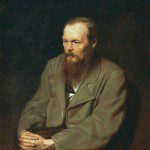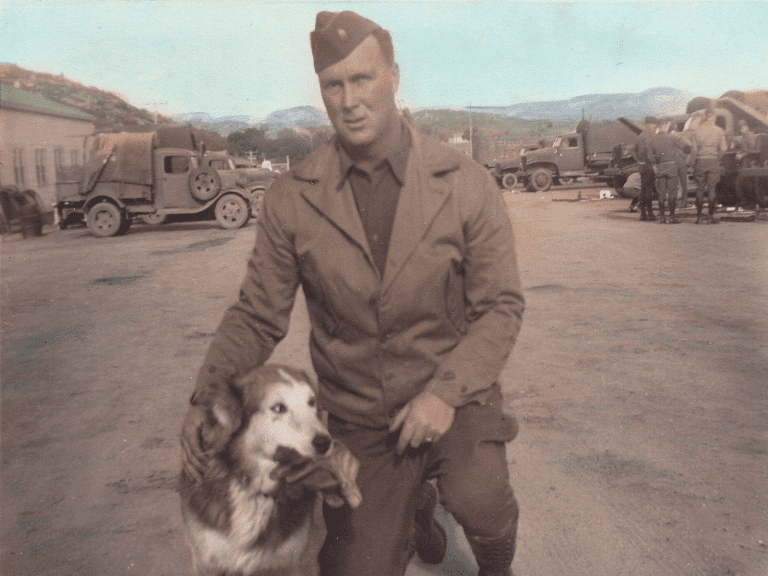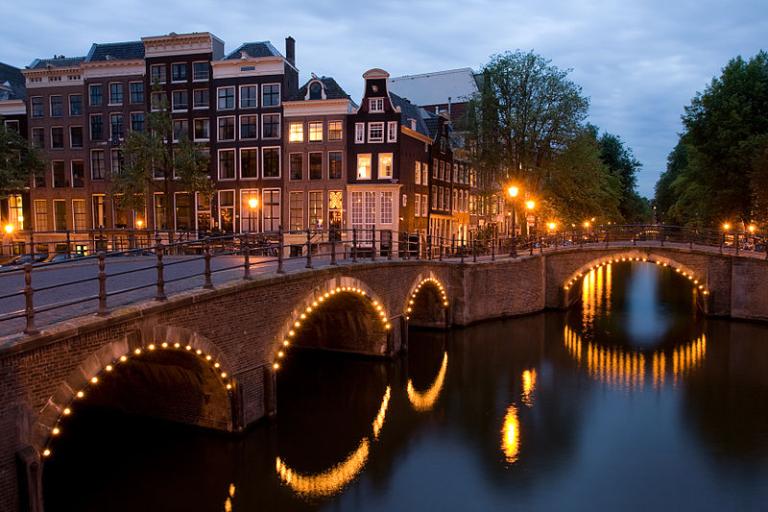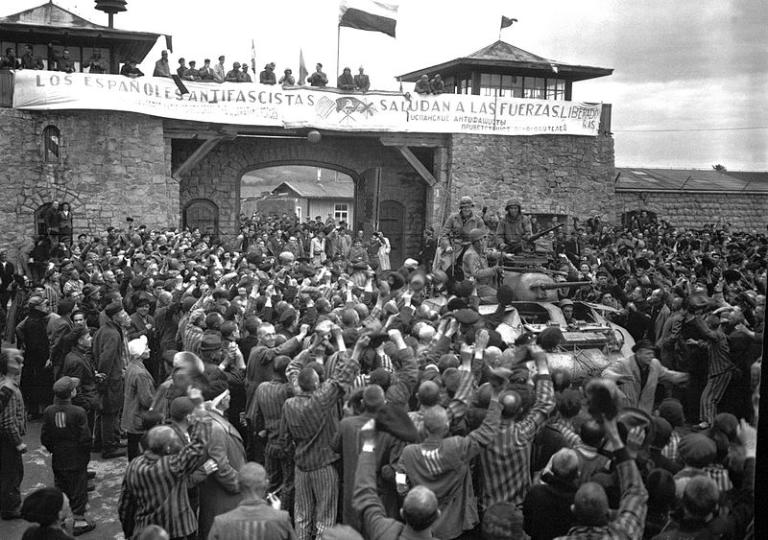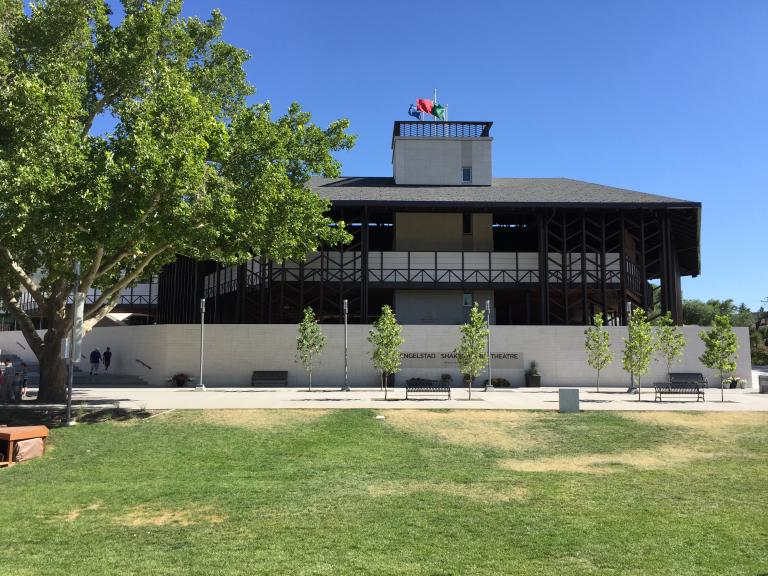
(Photograph by my wife)
We were rained upon Wednesday night, during the first portion of Romeo and Juliet. However, the weather apps that we consulted had assured us that there was no chance of rain yesterday. And who am I going to trust? The experts? Or my lying eyes? Nevertheless, we retreated for a little while to a covered area of the open air theater in which the Capulets and the Montagues were shortly to do their thing. Finally, though, the no-rain — which was surprisingly wet — dissipated and the play proceeded without damage. Except for one actor’s foot-slipping during a sword fight, prior to the final appearance of the backstage staff with cloths and mops.
This afternoon, Thursday afternoon, the no-rain and the thunder grew so intense while we were attending an indoor matinee of Shakespeare’s Coriolanus — I know, I know: you’re all desperately eager for my drama reviews, but they will come perhaps tomorrow or, more likely, on Saturday — that the rumbling and the pounding on the roof nearly drowned the actors out and we had to pause for about ten minutes owing to a power outage. I was happy, afterwards, to see that our car had not been washed away.
We had a late breakfast today with friends — former neighbors — who have moved to a beautiful new hilltop home in Hurricane, from which they have a magnificent view across to Zion National Park.
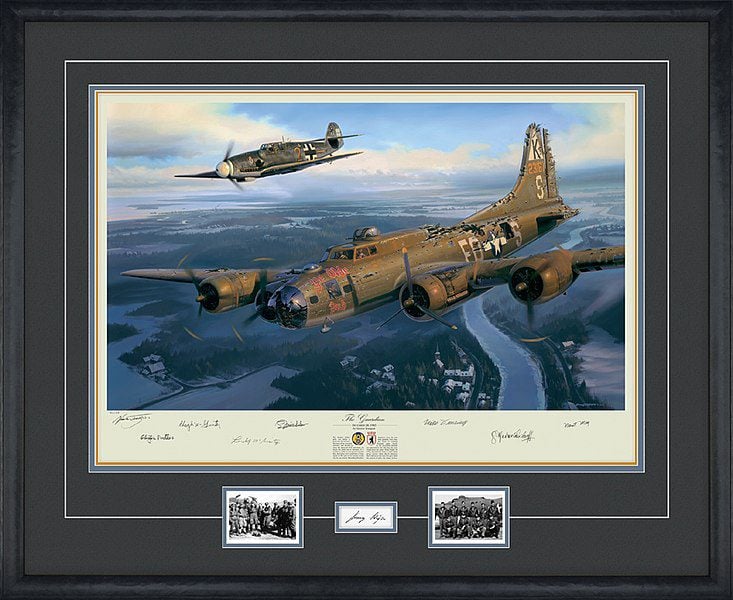
In stolen moments, I’ve been reading a non-fiction book about a pair of pilots during the Second World War — one American and the other German — that was recently given to me by a good friend and neighbor. It’s by Adam Makos, with Larry Alexander, and it’s entitled A Higher Call. One of the things that I’ve most appreciated about it thus far is its humanizing portrayal of pilots for the German Luftwaffe, who were by no means all Nazis. (Many, in fact, were not. More than a few actually held the Hitler regime in contempt.)
The focus of A Higher Call is a brief event in the skies over Germany in December 1943, when a badly damaged American B-17 bomber was struggling to fly out of German airspace, captained by a twenty-one-year-old Second Lieutenant by the name of Charlie Brown. Really. Charlie Brown. Half of his crew, who were trying to return from their first combat mission, were either dead or wounded. Suddenly, a Messerschmidt fighter, piloted by an experienced German ace named Franz Stigler, pulled up alongside the American plane.
Stigler needed just one more bomber “kill” to earn himself an Iron Cross. But he was also — and I think this significant — a devout Catholic who always carried a rosary with him and who had once, briefly, even considered becoming a priest. But he had been subjected to Nazi propaganda about the causes of the war — they were defending the Fatherland! — and his older brother, August, who was also a Luftwaffe pilot, had been killed very early in the war, in 1939, and so, unsurprisingly, Franz went through a period of bitter anger.
Seeing the desperate condition of the B-17 and (he was close enough to do it) the plight of its young crew, though, he chose rather to escort them past the German anti-aircraft batteries on the shore of the North Sea so that they might have a chance to live. It’s a stunning story. What Stigler did could easily have earned him the firing squad for treason — particularly since his brother, August, had, it turned out, been strongly anti-Nazi. (After August’s death, it was discovered that he had in his possession a copy of Pope Pius XI’s anti-Nazi encyclical Mit brennender Sorge., and it was even suggested that he might have had contact with famous Catholic-oriented Weiße Rose [White Rose] resistance group in Munich.) Both Franz Stigler and his mother had therefore been subjected to frightening interviews by the Gestapo.
Helping to save an American B-17 and its crew would certainly have been considered traitorous, since much lesser offenses were punished as such: For example, the book briefly recalls the story of a German war widow who was working in a munitions factory. She made the mistake of telling a joke: Hitler and Goering were standing atop the Berlin radio tower when Hitler said that he wanted to do something great for the German people, something that would put smiles on their faces. Did Goering have any suggestions? “Certainly,” Goering replied. “Why don’t you jump?” Another worker in the factory reported the woman, and she was was executed.
Adam Makos, the principal author of A Higher Call, was able to interview both Franz Stigler and Charlie Brown for the book, as well as others who were centrally or peripherally involved in the story.
From time to time, I’ll share with you an anecdote from the book about unexpected acts of humanity or surprisingly charitable attitudes among German pilots. There are a number of them. Here’s one:
Franz Stigler had been fascinated by flight since he was a young boy, when he and his brother began flying gliders in an aeronautics club that involved their priest as an advisor. When he was conscripted into the Luftwaffe and posted to Libya for the North African campaign, his mentor as a military fighter pilot was a man named Gustav Roedel.
Very early on, Roedel asked Stigler what he would do if ever he saw a British or American airman parachuting from an injured airplane. Stigler replied that he had never really thought about the question. Roedel, who was normally quite cheery, became stern and serious. “Honor is everything here,” he told Stigler,
“If I ever see or hear of you shooting at a man in a parachute,” Roedel said, “I will shoot you down myself . . . You follow the rules of war for you, not for your enemy,” Roedel said. “You fight by rules to keep your humanity.” (54, emphasis in the original)
Another North African anecdote struck me, as well:
Roedel asked how the mission went. “I got my first kill, sir,” Franz said. Roedel’s smile slowly disappeared. Franz wondered if he had said something wrong.
“I got two,” Voegl added. Roedel seemed unimpressed. He asked if there were any losses.
“Three,” Voegl replied. “Fluder, Krenzke, and Gromotka.” The missing pilots were from Squadron 6. Fluder had been the squadron leader and Roedel’s friend. Franz told Roedel he had witnessed both Fluder’s and Krenzke’s 109s exploding and was certain that both had been killed.
“Then why are you both smiling?” Roedel asked, his eyes emotional.
“Because of his first kill,” Voegl said.
Roedel dropped his arms to his sides.
“You score victories, not kills,” Roedel told Voegl, frustrated. “Haven’t you learned anything?” Turning to Franz, Roedel added, “You shoot at a machine not a man.” . . .
Franz sulked back to his tent, alone. He had achieved a fighter pilot’s milestone and tasted revenge [for his brother’s death]. Instead of feeling accomplishment, he suddenly felt very hollow.” (69-70, emphasis in the original)
As a boy, having seen many movies and documentaries about World War Two, I regarded all Germans of that period as Nazis and, accordingly, as demonically, inhumanly evil. I’ve long since outgrown that naïve and unnuanced view, but it’s still good to read accounts of decency amidst war. (That, I think, is why we love the story of the First World War’s famous “Christmas Truce.” It reminds us that goodness remains possible.)
Posted from Cedar City, Utah




